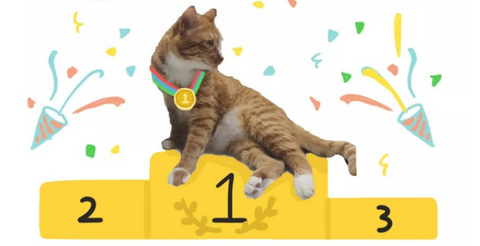Some cats play in cardboard boxes, like this:

And some cats play in the cardboard box, like this:

...Why do they all raise cats the same, and even eat the same cat food? Others raise cats, but I raise pigs...
Do cats also have different physiques of "getting fat when drinking saliva"/"not gaining weight when eating anything"? ?
Hi, you guessed it. Even as a cat, there are many unhappy things...
Some cats are fated to gain weight more easily
Around 150 cats were housed at the Massey University School of Nutrition (MUFNU) between 1991 and 2015. There are male cats and female cats. Most male cats have been neutered, while most female cats have not undergone neutering surgery.
They are grown in the same environment and are fed AAFCO compliant commercial cans on a daily basis (for the money..).

From the time they were born, the researchers strictly recorded their weight changes on a weekly basis until they reached their peak weight at the age of 9.
But in this situation where most of the acquired variables have been controlled, the cats still showed a large weight difference when they were 9 years old, and nearly 40 cats were overweight. (Male cat > 5.5kg, female cat > 4.5kg, BCS > 6)
Even if you are fat, you still have a bunch of DEBUFF behind the obesity, and there are a group of health risks eyeing you! Also, obesity can shorten the lifespan of cats
They grow up in the same environment and eat the same food. Why do some cats gain weight while others don’t? Probably... this is the fate in the legend.
Tens of thousands of feet tall buildings rise from the ground, and success can only depend on oneself.
As we all know, the best way to avoid obesity is not to gain weight... to kill obesity in the cradle from the beginning.
Fortunately, the researchers also gave the innate factors that may lead to obesity. See if your kitten is in the high-risk range!
Effect of gender on body weight
Both the growth rate and the average weight of male cats are accompanied by age and far exceed that of female cats.
The little tomcat grew fleshy, like a runaway wild horse, and became overweight by accident.
If you want to curb a wild horse, you must not give it grassland first.
Shut up and move your legs. Those who have little tomcats at home, please pay attention, make sure to let these children who are easy to gain weight move!
Body weight at 15 weeks
Regardless of whether it is a kitten or a kitten, the speed of weight growth reaches its peak around 15 weeks of age. Then the growth rate began to slow down, showing a jump-like decline.
The researchers found that body weight at 15 weeks of age was significantly associated with cat overweight at 9 years of age (P<0.01).

As the saying goes, three years old is old, and for a kitten, it is 15 weeks to see if it is fat in the future.
Therefore, it is recommended that the shit-shoveling officers must take the cat to a nearby hospital when the cat is 15 weeks old, weigh it, and let the doctor palpate to evaluate whether the cat is overweight.
Effect of season of birth on body weight
Seasons can affect a cat's food intake. But after the cycle of four seasons, it does not have a particularly large impact on the weight of the cat, and it can basically remain constant. What may really affect cats being overweight is the season in which the cat is born.
Cats born between June 21 and October 21 are the least likely to gain weight.
Cats born between March 21 and June 21 have a 5.7 times higher probability of being obese.
From October 21 to February 21, the ratio was 6.4 times.
Sounds metaphysical, right? But this is the conclusion drawn after a long period of experiments. Even, similar studies have been done on humans.
Seasonal Factors Affecting Human Obesity
Among severely obese Canadians over the age of 20, the proportion of births in spring and winter is higher (Wattie, Ardern, & Baker, 2008).
Among Japanese school-age children, those born in spring or summer are, on average, taller and heavier than those born in autumn and winter. (Tanaka et al., 2007).

The BMI and waist circumference of people born in spring in the northeastern United States were significantly higher than those born in other seasons. (Soreca, Cheng, Frank, Fagiolini, & Kupfer, 2013)
As for the fact that the cat's weight is affected by the seasons, the researchers believe that this may be related to the photoperiod and environmental temperature changes around the summer solstice, but the specific mechanism is still unclear.
Attention eligible cat parents!
Regardless, researchers have revealed to us several risky inborn factors that affect obesity:
Male cats, cats with a large body weight at 15 weeks of age, and cats born between October and June are high-risk cats for obesity.
On the contrary, it is generally believed that parental weight, birth weight, number of children born in the same birth, etc., have no particularly obvious relationship with obesity.
If everything happens to be right, it is best to start preventing obesity in advance, change ad libitum feeding to quantitative feeding, and play with the kitten for a while every day. Nip obesity and possible bad influences in the cradle!
